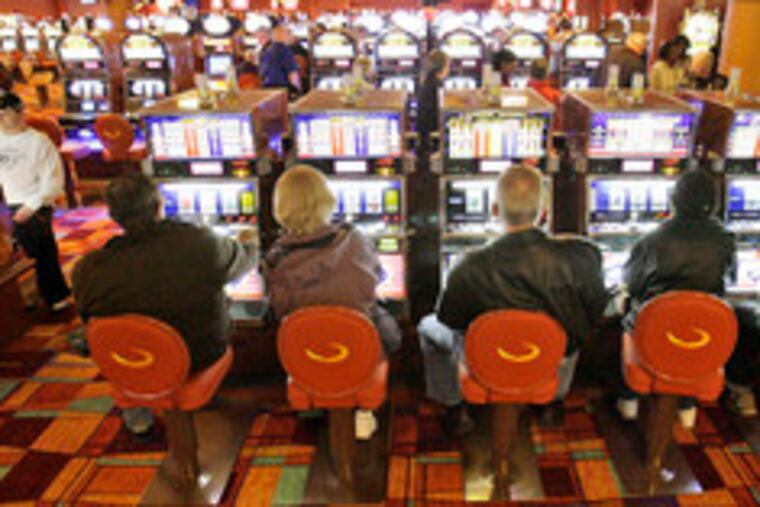Horsemen's group accuses Philly Park of reneging on plan
A horsemen's association accused the owner of Philadelphia Park Casino yesterday of reneging on its promise to build a $300 million slots parlor, after the company said it wanted a permanent license for its temporary operation.

A horsemen's association accused the owner of Philadelphia Park Casino yesterday of reneging on its promise to build a $300 million slots parlor, after the company said it wanted a permanent license for its temporary operation.
Greenwood Racing Inc., which owns and operates the racetrack with slot machines in Bensalem, denied the allegation. The company said that by applying to the Pennsylvania Gaming Control Board to have its current temporary license converted into a permanent license, it was merely trying to get more time to build the new and more-elaborate parlor.
"This is a classic bait-and-switch," said Michael P. Ballezzi, executive director of the Pennsylvania Thoroughbred Horsemen's Association, which represents about 4,000 members. "Greenwood Gaming is attempting to get away with a minimal investment at Philadelphia Park without investing the $300 million in a grand permanent casino it had originally promised during its licensure hearings.
"Rather than a premier destination, Philadelphia Park's casino could well be the worst in the state," he said. "This is unacceptable."
The casino said yesterday that it was not backing out of anything. Instead, it said, a revised master plan it submitted to the board April 5 was more ambitious than the original, because demand at the slots parlor has greatly exceeded expectations.
In the April petition, Greenwood asked for permission to add 12,500 square feet of casino and lounge space and 336 slot machines, which would bring its total number of slots to more than 2,400.
On Tuesday, the casino announced it had awarded $1 billion in payouts after just five months of operation. Philly Park averages about $8 million a day in payouts.
"The petition to the gaming board makes it abundantly clear that Philadelphia Park has not backed out of its commitment to develop and implement a master plan for the 450 acres of land it owns," a company statement said.
Robert Green, chairman and president of Greenwood Gaming & Entertainment Inc., which owns Greenwood Racing, said his team needed the additional time to make revisions to the expansion plan.
"Our investment at Philly Park is more than 10 times what we promised to the gaming control board for this point in time in our original proposal," Green said. "Our capital master plan will only enhance the facility and create a regional destination."
The state's gambling law, passed in the summer of 2004, approved up to 61,000 slot machines in 14 venues throughout the state. Two key components of the law were to provide statewide property-tax relief and to help revitalize the state's struggling horse racing industry by using proceeds from the new gambling operations. Six of the 14 licenses have been awarded to existing racetracks.
"The board can't comment about the petition because it is under review," said Doug Harbach, spokesman for the gaming control board. "We've met with Philly Park to try and clarify some issues and are exploring holding some hearings on this issue.
"They are basically asking for a change in conditions that were part of the license for the slots facility," Harbach said. "It's in their permanent-facility plans."
The contention between the horsemen's association and Philadelphia Park centered on a legal requirement that a permanent facility had to be completed within two years of the award of a conditional gaming license, with applicants' having the option of applying for an additional year.
When he went before the gaming board in September to seek a conditional slots license, Green said construction of a permanent facility would begin this spring, with completion of the property in late 2008 or early 2009.
Pete Peterson, a spokesman for the horsemen's association, said the group remained skeptical.
"If they were truly serious about looking at a new master plan, they would have established some type of time frame in their filing," he said. "None of the other slots operators have needed extra time.
"If this designates a permanent facility," he said, "there's no stick to require them to move forward with what's been promised."